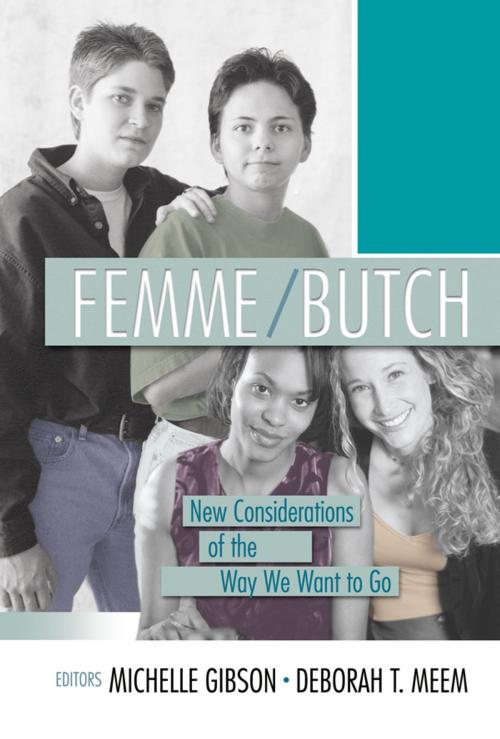Femme/Butch
New Considerations of the Way We Want to Go
Nonfiction, Social & Cultural Studies, Social Science, Gender Studies, Gay Studies, Sociology| Author: | Michelle Gibson, Deborah Meem | ISBN: | 9781317992394 |
| Publisher: | Taylor and Francis | Publication: | November 19, 2013 |
| Imprint: | Routledge | Language: | English |
| Author: | Michelle Gibson, Deborah Meem |
| ISBN: | 9781317992394 |
| Publisher: | Taylor and Francis |
| Publication: | November 19, 2013 |
| Imprint: | Routledge |
| Language: | English |
What are the meanings behind constructed lesbian identities?
This unique collection brings together writing, photography, artwork, and poetry about lesbian butch and femme gender. Femme/Butch: New Considerations of the Way We Want to Go distinguishes itself by celebrating a wide span of intellectual engagement, from reflection to traditional academic work, including both disciplinary and interdisciplinary approaches.
In addition to more “serious” writing, lesbian comediennes offer their irreverent takes on femme/butch in this book. Their perspectives are almost never found in academic publications, but what Lea DeLaria, Vickie Shaw, Karen Williams, and other edgy comics have to say about femme/butch sexuality deserves to be heard. You’ll also find that Femme/Butch is essential for the global perspective it brings to lesbian gender. With chapters focused on lesbians in Chinese cultures and on the emerging lesbian community in Bulgaria, this book explores the role of femme/butch identification in cultures without recognizable lesbian institutions.
Here are a few of the questions the contributors to Femme/Butch examine in this remarkable book:
- Can theory about femme/butch exist in the electric realm of sex and sexuality, or does theory necessarily neutralize sexuality?
- What role does popular culture play in helping us to theorize about lesbian gender?
- What are the relationships between history and femme/butch lesbian gender?
- Does lesbian identity development come in individual stages or is it more of a free-flowing process?
- How does social class relate to how we think about femme/butch race, ethnicity, and butch-femme?
Femme/Butch is an ideal guide to understanding:
- the similarities between stone-butch and transgender identities—using Leslie Feinberg’s Stone Butch Blues as a reference point
- the erotically resignified roles of Mommy, Daddy, girl, and boy in butch-femme
- femme/butch issues of power, trust, love, and loss
- the “female husbands” of the 18th century and their “wives”
- the meanings of cross-dressing for lesbians
- the variety of lesbian-queer genders—butch, femme, androgynous, and “other”
- and much more!
What are the meanings behind constructed lesbian identities?
This unique collection brings together writing, photography, artwork, and poetry about lesbian butch and femme gender. Femme/Butch: New Considerations of the Way We Want to Go distinguishes itself by celebrating a wide span of intellectual engagement, from reflection to traditional academic work, including both disciplinary and interdisciplinary approaches.
In addition to more “serious” writing, lesbian comediennes offer their irreverent takes on femme/butch in this book. Their perspectives are almost never found in academic publications, but what Lea DeLaria, Vickie Shaw, Karen Williams, and other edgy comics have to say about femme/butch sexuality deserves to be heard. You’ll also find that Femme/Butch is essential for the global perspective it brings to lesbian gender. With chapters focused on lesbians in Chinese cultures and on the emerging lesbian community in Bulgaria, this book explores the role of femme/butch identification in cultures without recognizable lesbian institutions.
Here are a few of the questions the contributors to Femme/Butch examine in this remarkable book:
- Can theory about femme/butch exist in the electric realm of sex and sexuality, or does theory necessarily neutralize sexuality?
- What role does popular culture play in helping us to theorize about lesbian gender?
- What are the relationships between history and femme/butch lesbian gender?
- Does lesbian identity development come in individual stages or is it more of a free-flowing process?
- How does social class relate to how we think about femme/butch race, ethnicity, and butch-femme?
Femme/Butch is an ideal guide to understanding:
- the similarities between stone-butch and transgender identities—using Leslie Feinberg’s Stone Butch Blues as a reference point
- the erotically resignified roles of Mommy, Daddy, girl, and boy in butch-femme
- femme/butch issues of power, trust, love, and loss
- the “female husbands” of the 18th century and their “wives”
- the meanings of cross-dressing for lesbians
- the variety of lesbian-queer genders—butch, femme, androgynous, and “other”
- and much more!















